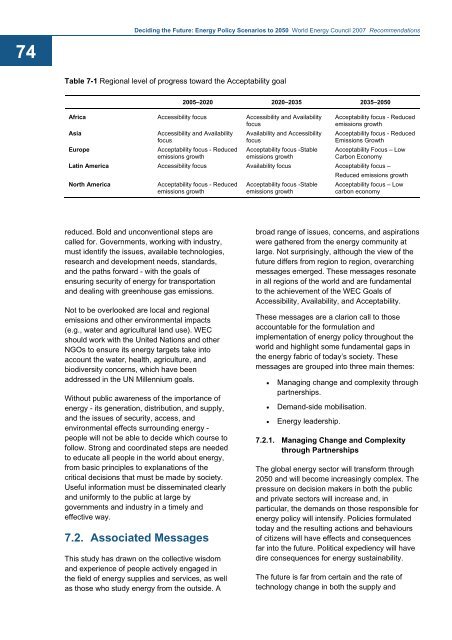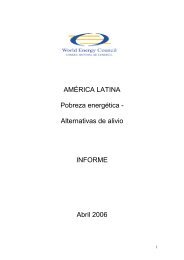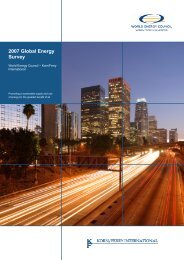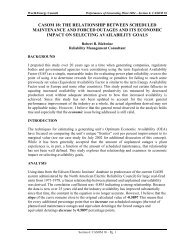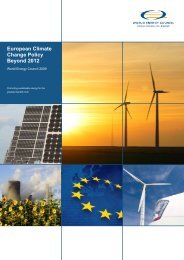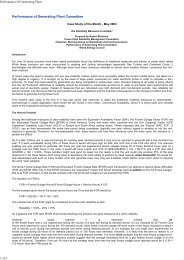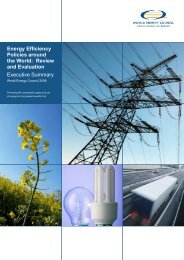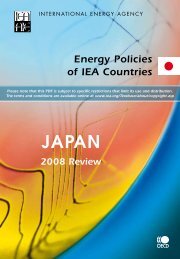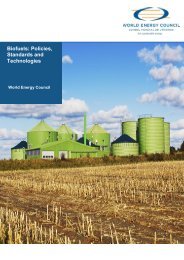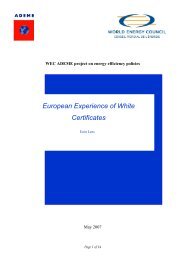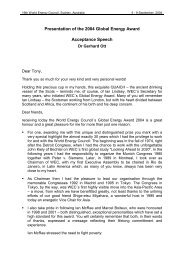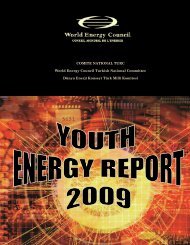Deciding the Future: Energy Policy Scenarios to 2050
Deciding the Future: Energy Policy Scenarios to 2050
Deciding the Future: Energy Policy Scenarios to 2050
You also want an ePaper? Increase the reach of your titles
YUMPU automatically turns print PDFs into web optimized ePapers that Google loves.
<strong>Deciding</strong> <strong>the</strong> <strong>Future</strong>: <strong>Energy</strong> <strong>Policy</strong> <strong>Scenarios</strong> <strong>to</strong> <strong>2050</strong> World <strong>Energy</strong> Council 2007 Recommendations<br />
74<br />
Table 7-1 Regional level of progress <strong>to</strong>ward <strong>the</strong> Acceptability goal<br />
2005–2020 2020–2035 2035–<strong>2050</strong><br />
Africa Accessibility focus Accessibility and Availability<br />
focus<br />
Asia<br />
Europe<br />
Accessibility and Availability<br />
focus<br />
Acceptability focus - Reduced<br />
emissions growth<br />
Availability and Accessibility<br />
focus<br />
Acceptability focus -Stable<br />
emissions growth<br />
Acceptability focus - Reduced<br />
emissions growth<br />
Acceptability focus - Reduced<br />
Emissions Growth<br />
Acceptability Focus – Low<br />
Carbon Economy<br />
Latin America Accessibility focus Availability focus Acceptability focus –<br />
Reduced emissions growth<br />
North America<br />
Acceptability focus - Reduced<br />
emissions growth<br />
Acceptability focus -Stable<br />
emissions growth<br />
Acceptability focus – Low<br />
carbon economy<br />
reduced. Bold and unconventional steps are<br />
called for. Governments, working with industry,<br />
must identify <strong>the</strong> issues, available technologies,<br />
research and development needs, standards,<br />
and <strong>the</strong> paths forward - with <strong>the</strong> goals of<br />
ensuring security of energy for transportation<br />
and dealing with greenhouse gas emissions.<br />
Not <strong>to</strong> be overlooked are local and regional<br />
emissions and o<strong>the</strong>r environmental impacts<br />
(e.g., water and agricultural land use). WEC<br />
should work with <strong>the</strong> United Nations and o<strong>the</strong>r<br />
NGOs <strong>to</strong> ensure its energy targets take in<strong>to</strong><br />
account <strong>the</strong> water, health, agriculture, and<br />
biodiversity concerns, which have been<br />
addressed in <strong>the</strong> UN Millennium goals.<br />
Without public awareness of <strong>the</strong> importance of<br />
energy - its generation, distribution, and supply,<br />
and <strong>the</strong> issues of security, access, and<br />
environmental effects surrounding energy -<br />
people will not be able <strong>to</strong> decide which course <strong>to</strong><br />
follow. Strong and coordinated steps are needed<br />
<strong>to</strong> educate all people in <strong>the</strong> world about energy,<br />
from basic principles <strong>to</strong> explanations of <strong>the</strong><br />
critical decisions that must be made by society.<br />
Useful information must be disseminated clearly<br />
and uniformly <strong>to</strong> <strong>the</strong> public at large by<br />
governments and industry in a timely and<br />
effective way.<br />
7.2. Associated Messages<br />
This study has drawn on <strong>the</strong> collective wisdom<br />
and experience of people actively engaged in<br />
<strong>the</strong> field of energy supplies and services, as well<br />
as those who study energy from <strong>the</strong> outside. A<br />
broad range of issues, concerns, and aspirations<br />
were ga<strong>the</strong>red from <strong>the</strong> energy community at<br />
large. Not surprisingly, although <strong>the</strong> view of <strong>the</strong><br />
future differs from region <strong>to</strong> region, overarching<br />
messages emerged. These messages resonate<br />
in all regions of <strong>the</strong> world and are fundamental<br />
<strong>to</strong> <strong>the</strong> achievement of <strong>the</strong> WEC Goals of<br />
Accessibility, Availability, and Acceptability.<br />
These messages are a clarion call <strong>to</strong> those<br />
accountable for <strong>the</strong> formulation and<br />
implementation of energy policy throughout <strong>the</strong><br />
world and highlight some fundamental gaps in<br />
<strong>the</strong> energy fabric of <strong>to</strong>day’s society. These<br />
messages are grouped in<strong>to</strong> three main <strong>the</strong>mes:<br />
• Managing change and complexity through<br />
partnerships.<br />
• Demand-side mobilisation.<br />
• <strong>Energy</strong> leadership.<br />
7.2.1. Managing Change and Complexity<br />
through Partnerships<br />
The global energy sec<strong>to</strong>r will transform through<br />
<strong>2050</strong> and will become increasingly complex. The<br />
pressure on decision makers in both <strong>the</strong> public<br />
and private sec<strong>to</strong>rs will increase and, in<br />
particular, <strong>the</strong> demands on those responsible for<br />
energy policy will intensify. Policies formulated<br />
<strong>to</strong>day and <strong>the</strong> resulting actions and behaviours<br />
of citizens will have effects and consequences<br />
far in<strong>to</strong> <strong>the</strong> future. Political expediency will have<br />
dire consequences for energy sustainability.<br />
The future is far from certain and <strong>the</strong> rate of<br />
technology change in both <strong>the</strong> supply and


